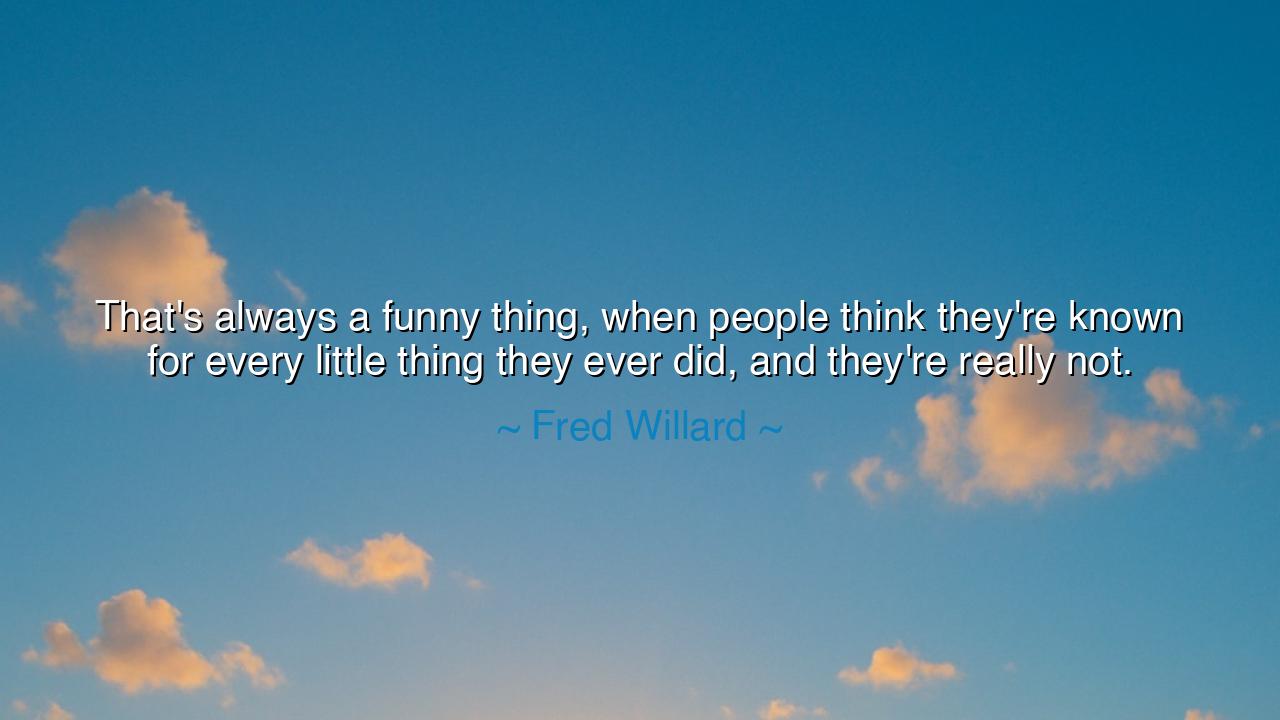
That's always a funny thing, when people think they're known for
That's always a funny thing, when people think they're known for every little thing they ever did, and they're really not.






“That’s always a funny thing, when people think they’re known for every little thing they ever did, and they’re really not.” — thus spoke Fred Willard, the American actor and comedian, whose humor was light yet wise, and whose laughter often carried the tone of truth. Beneath this modest, almost casual remark lies a deep reflection on human vanity and the illusions of recognition. Willard, a man who lived in the shimmering world of performance, saw through the mirage that so often deceives both the famous and the forgotten: the belief that others are always watching, always remembering, always judging. Yet in truth, the world forgets much — and that is both its cruelty and its mercy.
The meaning of his words reaches far beyond the stage or screen. It is a meditation on how we, as human beings, are bound by the desire to be remembered — to believe that our actions, good or ill, are immortal in the eyes of others. We walk through life half in fear, half in pride, imagining that the world keeps a ledger of our every deed. But Willard, who knew the fickleness of fame, reminds us with a smile that this is not so. Most people are not watching us as closely as we think. Our mistakes are soon forgotten, our triumphs quickly replaced by new ones. What we think of as monumental in our own story is often no more than a passing moment in the lives of others.
And yet, there is grace in this forgetting. Fred Willard’s wisdom teaches us humility and freedom at once. For if the world does not remember every flaw, then we are free to begin again. If others are not holding our past against us, then we need not chain ourselves to it either. In the grand theater of life, the audience moves on — and that is not tragedy, but release. We are reminded to laugh, to forgive, to keep moving forward. The fear of constant judgment is a cage of our own making; Willard’s humor gently opens its door.
Consider the story of Marcus Aurelius, the philosopher-emperor of Rome, who once wrote: “All is ephemeral — fame and the famous alike.” He ruled one of the greatest empires in history, yet even he understood that memory fades. He asked himself, “How many men remember Alexander the Great? And how many remember those who remembered him?” What Willard said in jest, Aurelius said in solemn philosophy: the world forgets. Its attention is as fleeting as smoke on the wind. And if even emperors and conquerors are not remembered for every little thing, how foolish it is for us to imagine that our smallest acts are immortal in the eyes of others.
There is another layer of meaning in Willard’s words — one born of compassion. He does not mock those who long to be remembered; rather, he smiles at their innocence. For to think we are known for everything we do is a sign of self-importance, but also of loneliness — a yearning to matter, to leave an imprint. His gentle humor reminds us that we do matter, but not in the way we imagine. We are remembered not for our perfection, but for our presence — not for every act, but for the warmth we brought into the lives of others. The world forgets our details, but it remembers our essence.
Thus, Willard’s insight becomes not just a jest, but a form of wisdom. It teaches us to live lightly — to do good not for applause, but for the joy of doing it; to forgive our errors and not magnify them in shame; to accept that even if the world does not remember us perfectly, it does not mean our life lacked meaning. True legacy is not the catalog of every action, but the quiet impression we leave upon the hearts of others.
Let this be the lesson: be humble in fame, and merciful in failure. Do not cling to the illusion that all eyes are upon you. The world moves swiftly, and memory fades like the tide — yet this should not grieve you. Rather, let it free you to live with courage, to laugh at your mistakes, and to start anew each day. Be kind because it is right, not because it is seen. And when you err, do not despair — for as Fred Willard reminds us, most people will have forgotten long before you finish blaming yourself.
So walk through life with lightness of heart. Do your work, share your gifts, laugh often, and let the world’s forgetting be your peace. For in the end, it is not being known for everything that matters — it is being true, being kind, and being present while you are here. The rest, as Willard would say with a smile, is just part of the show.






AAdministratorAdministrator
Welcome, honored guests. Please leave a comment, we will respond soon